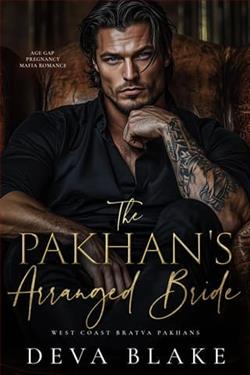Page 173 of The Sin Binder's Vow
Then let’s play,mine answers.
Silas leans in, whispering just loud enough for me to hear, “Remind me to worship your pettiness later. Might be my new religion.”
I flick him a look, then return my attention forward.
Elias coughs—chokes, really—on laughter he tries to hide in his sleeve. “You justmovedher out of frame,” he murmurs. “Like a curtain on a bad act.”
“Shewasthe act,” Silas mutters, “and not the good kind.”
Ambrose says nothing. But his hand twitches against the armrest. Then stills.
And I sit there, eyes on the stage, pulse steady now. She wanted to make him look. I made sure he didn’t have to.
And the play hasn’t even started yet.
Keira leans forward, her arm draped over the velvet ledge, her profile tilted just enough to catch the light, the perfect angle of attention-seeking elegance. Every movement is subtle, deliberate. Every shift of her shoulder, every lift of her chin designed to draw Ambrose’s gaze back to her.
It’s gross. Not because she’s beautiful. Not even because it’s working—because itisn’t.It’s gross because it’s calculated. Cruel. A performance she crafted just to remind him he’s still bleeding.
And he is.
I see it in the set of his spine, the unnatural stillness of it. Too straight. Too controlled. His fist clenched so tight in his lap I can see the bone straining beneath the skin. His jaw’s locked, gaze fixed somewhere far past the stage. Like if he focuses hard enough, he won’t remember what it was like to love someone who carved him open and walked away smiling.
I want to scream.
Because yeah, he hurt me. Left me in a moment that still echoes too loud when I’m alone. But this… this pain twisting behind his perfect posture isn’t about me.
It’s abouther.
He hasn’t moved. Hasn’t looked at her. But every part of him screams that he’sfeelingher. And maybe I should let him feel it.Maybe I should sit here, proud and distant, and let him drown in the choice he made.
But I can’t.
Because I know that look. I know what it means to hold yourself that still just to keep from shattering. I know what it means to want someone to save you from your own pride, but not know how to ask.
So I lean closer.
Not enough for the others to hear. Just enough for him tofeelme beside him, my voice low and steady, not a demand—an offering.
“The bargain still stands,” I whisper, “as long as you need it to.”
His head turns, slowly, like he didn’t expect that. Like he can’t believe I’d give it to him after everything.
And his eyes—Gods, there’s so muchwreckagein them. Not the sharp, unreadable gaze he uses like armor. But confusion. Raw, open disbelief.
“Why?” he says.
Just one word. Just that. But the way he says it—it’s like he’s never had someone give without taking.
And I want to lie. Say I’m doing it for strategy, to make the Council think we’re aligned. Say I’m keeping my enemies close, that I’m usinghim.
But I don’t. Because the truth is simple. Awful. And real.
“Because you’re one of us,” I say quietly. “Even when you don’t know how to be.”
His mouth opens. Closes. There’s a war behind his eyes, the kind that never ends in victory—just surrender or silence.
He nods once. Not a thank you. Not acceptance. But something like a promise.















